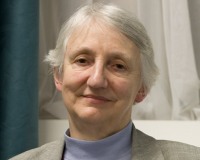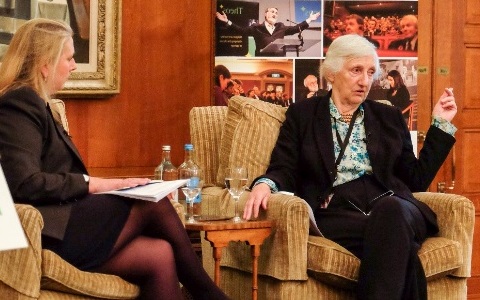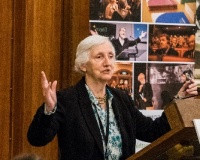'No one has a right not to be offended’ says ECHR Chair.
by - 26th October 2015
 THERE should be no such thing as a ‘right not to be offended’, a top human rights lawyer said last week.
THERE should be no such thing as a ‘right not to be offended’, a top human rights lawyer said last week.
Baroness Onora O’Neill, Chair of the Equality and Human Rights Commission, argued that it was possible to legislate against certain speech-acts, but that any ‘right not to be offended’ would be unworkable.
‘There is no way of securing freedom of expression if we also maintain that there is a right not to be offended.
‘Any supposed right not to be offended would founder on the fact that offensiveness is subjective, and would put others’ freedom of expression wholly at the mercy of the sensibilities of possible audiences, including audiences who may include some who are hypersensitive, paranoid or self-serving—or worse’.
The Baroness of Belgarve made her remarks at the annual Theos Lecture last Tuesday night at the Honourable Society of the Inner Temple.
She explored the implications, anomalies and problems that the rights to freedom of expression and religion (Articles 9 and 10 of the European Convention on Human Rights) pose to lawmakers and citizens.
Balance
In contrast to many European countries, O’Neill said that the United Kingdom had struck the right balance.
‘Our legislation, I think correctly, does not restrict freedom of expression merely because some speech act offends some others, or even offends some of them gravely.’
She argued that the best response to abuse was not violence, complaint or legislation, but dialogue.

‘The most effective action to take if one feels offended, and there is no breach of one’s rights, is nearly always not to take offence . . . is to speak to those whose speech offended.
‘They may not have wished to offend.
‘Even if they aimed to offend, speaking to them may educate them, or make them more cautious, and may allow those who were offended to reaffirm a reasonable feeling of self-respect, in that they do not, as we say, “take it lying down”.’
Cambridge academic Mary Beard, who had been repeatedly subject to vicious abuse by anonymous online trolls, was a model, she said.
‘Last year Mary Beard, the Cambridge classicist, was viciously trolled in ways that many of us would find deeply offensive.
‘She spoke with her troll, gained his attention, and after some discussion helped him get back into employment
‘In general more speech is the best way to deal with disagreement, including that expressed in speech to which one takes exception or finds offensive.’
Belief

O’Neill also attempted to address the problems of defining how exactly notions like ‘religion’ and ‘belief’ might be understood.
‘The term belief, as we use it in everyday life can be so wide.
‘Belief is not just any old belief as it occurs in Article 9.
‘It’s a systemic, life-orienting set of practices.’
Some experts had found the wide-ranging definition of religion problematic.
She quoted Peter Edge and Lucy Vickers’ conclusion in their Review of Equality and Human Rights Law Relating to Religion and Belief that the ‘”broad definition of belief currently being applied by the courts is unclear, and some rulings appear inconsistent with others”.’
Fox-hunting
O’Neill highlighted certain examples.
‘It is puzzling to find opposition to fox-hunting classified as a “religion or belief”, but support for fox-hunting not classified as a “religion or belief”.’
Passion, she also noted, had no bearing on whether a religious belief was to be sheltered.
‘Religious beliefs that are tepid and lukewarm are still protected.’

Asked how a more nuanced understanding of the relationship between freedom of expression and freedom of religion might be taught, O’Neill argued that ‘religious literacy is pretty important.
‘To be told the vocabulary of the festivals is alright for primary school but to gain an inwardness with what traditions, religious or secular, are about, I think you’ve just got to have so much more than that.’
Limiting
Elizabeth Oldfield, Director of Theos, agreed saying that contemporary debate surrounding religion could be ‘shrill, tribal and shallow’.
She also said that ‘religion’ as a descriptor could be limiting.
‘As often as possible we acknowledge its limits as a term. Different people understand different things by it.
‘In one sense this is a ridiculous area we are trying to legislate around because we can’t agree on the terms even amongst small groups of believers let alone society as a whole.
‘But we have to because we are very deeply different and we need to live together. I don’t envy the legislation having to work around this.’
